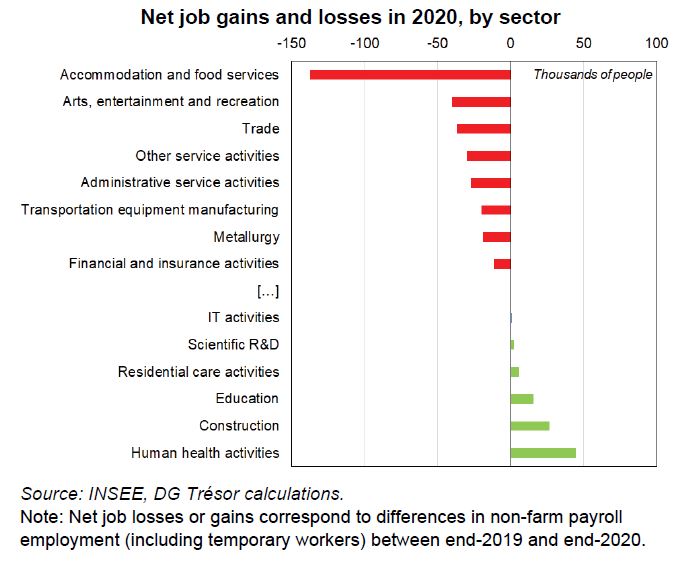Skills and Intersectoral Labour Reallocation in the aftermath of the COVID-19 Crisis
The crisis could accelerate sectoral reallocations of jobs. Even after the expected rebound once the restrictions are lifted, activity in some sectors could remain below pre-crisis levels. This will imply job losses in some sectors and job creation in others, the extent of which will depend on the capacity of employment to reallocate. In order to support retraining, it is important to inform workers about support and training schemes.
In 2020, France reported 296,000 net payroll job losses, or 1.2% of total jobs. Most occurred in a small number of sectors, including accommodation and food services, arts and entertainment, trade, and transportation equipment manufacturing. By contrast, sectors reporting net job creations included health, residential care activities, education and construction. All told, net job losses were limited compared to the 8% drop in GDP, and employment began rising again in the first quarter of 2021.
While most workers will return to jobs in the same sector following the crisis, there will nevertheless be reallocations owing to long-term changes in demand, e.g. the expansion of teleworking and the decline in business travel. How smoothly the reallocations occur will determine the strength of the rebound in the economy and in productivity. The challenge is to avoid a situation in which high unemployment exists alongside unfilled job vacancies.
A number of occupations faced recruitment shortages before the crisis. Some could continue, because the underlying factors will remain unresolved, e.g. those related to a lack of trained workers (nurses, nursing assistants, midwives, IT technicians and engineers, and R&D personnel).
Some skills that are widespread in sectors with net job losses (e.g. team management, order management, computer proficiency) are also required in job-creating sectors, whereas others (inventory management, sales, customer relations) are in far less demand. As a general rule, there is more distance between the skills possessed by low-skilled workers and those required by occupations in growing demand.
To facilitate intersectoral labour reallocation post-crisis, jobseekers and payroll employees should be fully informed regarding employment and career opportunities, and given support in addressing their training requirements. The Career Choice Act and the recovery plan provide significant resources for this purpose.
.
